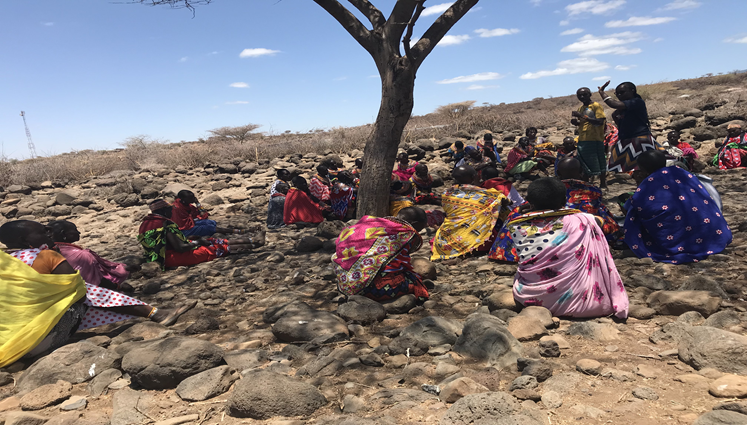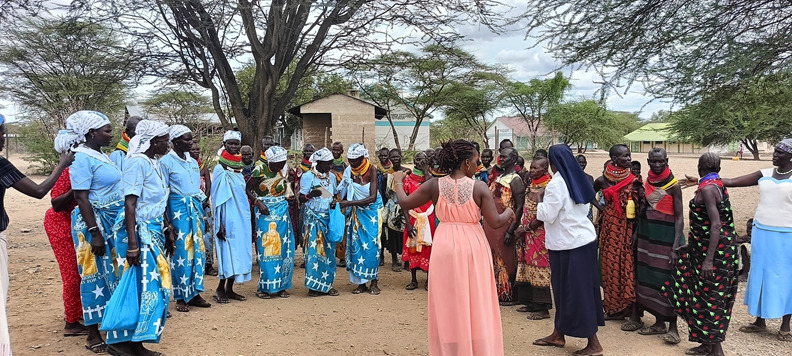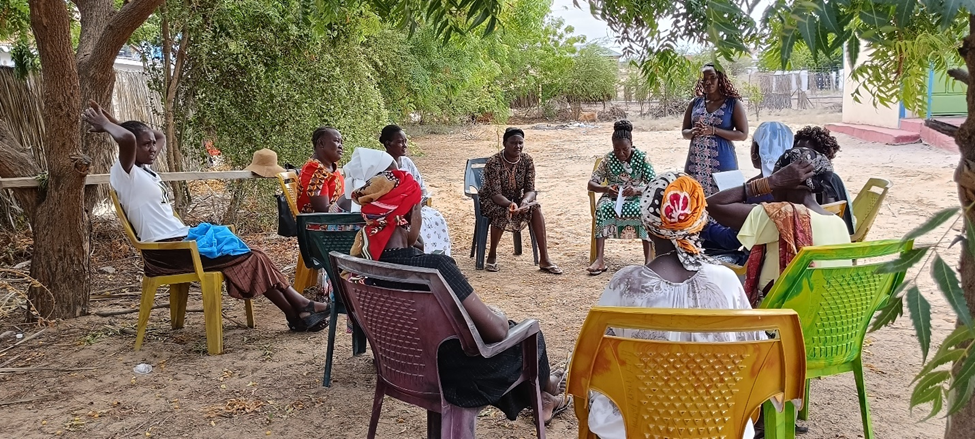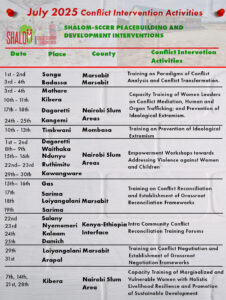By: Judith Akedi MA,
“Thank you, Shalom, for empowering us pastoralist women in this part of the country. We appreciate you recognizing the many forms of violence we go through and the need for us to be empowered to transform them.” (Seline Locham, key influential opinion leader)
The remote areas of Northern Kenya have historically experienced inter-ethnic pastoralist conflicts, involving issues of competition over scarcity of pasture and water, traditional cultural practices and ethnicity. The Shalom Empowerment Center (SEC) addressing violence against women and children ─ an important outreach project of the Shalom-SCCRR primarily attending to violence against women and children held its first workshop with the women influential opinion leaders in Lodwar in the month of November 2023.

The social conditions and challenges that women and children face on a daily basis in marginalized remote locations are protracted. The arid and semi-arid nature of the north western region of Kenya contributes to intense competition over limited resources such as water and pasture. Women, as primary caregivers of their families and livestock, bear the brunt of resource scarcity. Conflict often arises over access to these essential resources, exacerbating gender-based vulnerabilities. Historical tensions and disputes between different pastoralist communities escalate into conflicts, negatively impacting women who often become victims of displacement, violence, and loss of property.
However, underpinning these issues are major structural violence factors, centering on core resources, infrastructure-insecurity, state neglect, and illicit activities in spheres of the political economy (Devine 2016).

Conflict situations heighten the risk of gender-based violence, including domestic violence and sexual assault. Women in this region face increased vulnerability, and the breakdown of social structures during conflicts has contributed to a culture of impunity regarding violence against women. Persistent conflicts hinder educational opportunities for women and girls. Displacement, insecurity, and cultural norms that prioritize boys’ education result in a significant gender gap in educational attainment, limiting women’s empowerment and economic opportunities. Furthermore, conflict disrupts access to essential health care services, impacting women’s reproductive health, maternal care, and overall well-being. Displacement and insecurity hinder the ability to access health facilities, exacerbating existing health disparities.
Through our SEC project, Shalom- SCCRR -seeks to give special attention to all forms of manifest and structural violence. In the month of November, Shalom- SCCRR held its first workshop using the three analytical paradigms of conflict analysis underlying violence, namely the strategist (use of power), peace research (structures and institutions), and conflict research (environment contingencies) paradigms for the women opinion leaders in Lodwar. Empowering women to be significant architects of their own security and development is at the heart of SEC’s programs. The women lauded Shalom-SCCRR for an empowerment training workshop that was a first of its kind. “Thank you, Shalom, for empowering us pastoralist women in this part of the country. We appreciate you recognizing the many forms of violence we go through and the need for us to be empowered to transform them.” (Seline Locham, Key influential opinion Leader). The trainings have seen women empowered with analytical skills and peacebuilding techniques for conflict transformation and reconciliation. More women, 1411 in number have been trained in the slum areas around Nairobi─ (Riruta; Waithaka; Dagoretti; Kibera; Mathare; Kariobangi; Korogocho; Kangemi; Mtego; Kawangware; and Huruma), Turkana, West-Pokot, Samburu and Marsabit counties.

Shalom-SCCRR, through constant attention to the needs of women, first of all enabled the increase of participation of women in conflict transformation and peacebuilding training workshops. In 2023, the Shalom Empowerment Center (SEC) addressing violence against women and children SEC has provided training on conflict transformation skills, peacebuilding techniques, Post-Traumatic Stress Disorder (PTSD) healing approaches, and other relevant interventions to women and children suffering from violence through women opinion shapers and coordinated community groups that have driven meaningful change at the community level.
This has led to the empowerment of an expansive understanding of the key underlying causes of these conflicts and conflict dynamics in general. Moreover, women are enabled with acquiring a range of practical skills that are essential in the management of conflict and the handling of post-conflict situations.
Mrs. Judith Akedi Otsieno MA, Shalom-SCCRR Project Officer Nairobi; & Women and Children’s Projects
RELEVANT LINKS
- Shalom-SCCRR. (2022). Shalom Empowerment Center (SEC) Addressing Violence against Women and Children: Concept Document. https://shalomconflictcenter.org/eastern-africa-shalom-empowerment-center-sec-addressing-violence-against-women-and-children-concept-document/
- Moran, M. (2022). Shalom Empowerment Center opens in Nairobi, Kenya. https://www.indcatholicnews.com/news/45158
- Otsieno, J. & Kibe, E. (2022). Shalom Empowerment Center (SEC) Addressing Violence against Women and Children: A Unique Shalom-SCCRR Initiative Opened. https://shalomconflictcenter.org/shalom-empowerment-center-sec-addressing-violence-against-women-and-children-a-unique-shalom-sccrr-initiative-opened/
- Tembo, E. (2023). St. Josphat’s House (Kabiria-Riruta), A Place To Go; Some Shalom-SCCRR Projects in Action. https://shalomconflictcenter.org/st-josphats-house-kabiria-riruta-a-place-to-go-some-shalom-sccrr-projects-in-action/
- Otsieno, J. (2023). Empowering Women to Transform Conflict with Expertise: Shalom-SCCRR’s Initiatives in Conflict-Affected Areas of Northern Kenya. https://shalomconflictcenter.org/empowering-women-to-transform-conflict-with-expertise-shalom-sccrrs-initiatives-in-conflict-affected-areas-of-northern-kenya/
- Kibe, E & Otsieno, J. (2023). Shalom-SCCRR continues to Empower Women with Conflict Analytical Skills and Peacebuilding Techniques in Marginalized Environments. https://shalomconflictcenter.org/happy-international-womens-day-4/
- Shalom-SCCRR. (2023). Shalom Empowerment Center (SEC) 2022 Results & Achievements. https://shalomconflictcenter.org/shalom-empowerment-center-sec-2022-results-and-achievements/
- Wamae, J. (2020). Shalom-SCCRR’s Contribution to Women in Conflict Transformation and Peacebuilding. https://shalomconflictcenter.org/shalom-sccrrs-contribution-to-women-in-conflict-transformation-and-peacebuilding/
- Shalom- SCCRR. (2023). 2009-2022 Shalom-SCCRR Results and Achievements.https://shalomconflictcenter.org/wp-content/uploads/2023/06/13-Years-of-Shalom-SCCRR-2009-2022-SV-20230624.pdf
- Shalom-SCCRR. (2023). Prof. Wanakayi K. Omoka’s Understanding of the Philosophy and Work of Shalom-SCCRR Recollected; Augmented with 2022 Results by the Dept. of Monitoring, Evaluation, Research, and Learning (MERL). https://shalomconflictcenter.org/recalling-prof-wanakayi-k-omoka-phd-understanding-of-the-philosophy-and-work-of-shalom-sccrr-augmented-with-2022-shalom-sccrrs-achievements-and-results/
- Devine, P. R. (2023). Shalom-SCCRR Chairman’s Report on Progress and Achievements in 2022. https://shalomconflictcenter.org/chairmans-report-on-progress-and-achievements-in-2022/
- Awed, A. (2021). The Girl-Child: Shalom-SCCRR Impacting Education & the Lives of Young Girls in Marginalized and Remote Locations in Eastern Africa. https://shalomconflictcenter.org/the-girl-child-shalom-sccrr-impacting-the-lives-of-young-girls-in-marginalized-and-remote-locations-in-eastern-africa/
- Shalom-SCCRR, Who We Are; 2022-2023-Synopsis. https://shalomconflictcenter.org/shalom-sccrrs-who-we-are-2022-2023-synopsis-2/

